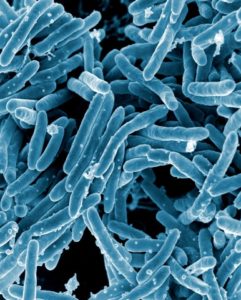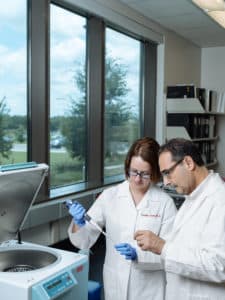- TB is a leading cause of death worldwide by a single infectious disease
- Texas has the second highest rate of TB cases in the US
- New NIH training center will help elevate San Antonio’s reputation as a national TB research hub
SAN ANTONIO (March 23, 2022) – Texas Biomedical Research Institute has been selected by the National Institutes of Health (NIH) to host one of the nation’s inaugural training centers for tuberculosis (TB) research.
The “Interdisciplinary NexGen TB Research Advancement Center” (IN-TRAC) will harness the extensive expertise, unique facilities and collaborations based at Texas Biomed and across South Texas, including the only free-standing TB hospital in the U.S., and field research at the Texas-Mexico border. The result: a world-class training program for the next generation of TB researchers.
“We do have to train the next and the best,” says Joanne Turner, PhD, Texas Biomed’s Executive Vice President, Research. “They’re the ones who are going to implement a lot of the cures and treatments.”

TB is one of the leading killers worldwide, infecting more than 10 million people a year and killing more than 1 million a year. World TB Day on March 24 aims to raise awareness about the disease and efforts to address it, such as the World Health Organization’s End TB Strategy. The COVID-19 pandemic significantly set back TB prevention, diagnosis and treatment, and deaths from TB increased in 2020 for the first time in over a decade. While rates are far higher in other countries, more than 13 million people in the U.S. are estimated to be living with latent, or dormant, TB infection.
“California and Texas are the top two states in the country with cases of TB,” says Texas Biomed President/CEO and principal investigator Larry Schlesinger, MD. “TB is not a phenomenon ‘over there’. It’s actually over here.”
Schlesinger notes that tackling TB, which is a complex disease caused by a highly transmissible bacteria passed human-to-human, is going to take time – and that means more research into the immune system, drug-resistant pathogens, treatments and vaccines.
As part of its strategic plan for TB research, the U.S. National Institute of Allergy and Infectious Diseases (NIAID) solicited applications to establish the first Interdisciplinary NexGen TB Research Advancement Centers (IN-TRAC) in 2021, and pledged to fund up to five centers. Texas Biomed was recently selected to host one of these inaugural centers and will receive about $5.8 million over the next five years to support the training program. Other centers have not yet been announced.
The overarching goal of the IN-TRAC at Texas Biomed is to ensure that the next generation of TB researchers has the diverse skills and real-world experience to effectively tackle this challenging disease. The key is cross-training.

“That’s what really makes good scientists these days,” says Turner.
Post-doctoral scientists and staff scientists at Texas Biomed will not just study the basic science of TB bacteria and how it interacts with the human immune system in petri dishes, but learn about different animal models that can help evaluate new drugs or vaccines. They will also get to go to field sites to learn first-hand how robust clinical trials are set up and run, and go to the hospital to see patients with TB.
“Seeing TB disease is eye opening for trainees,” Turner says. “Going to a clinic and actually seeing what the disease does to a person physically, really brings them back with a drive to do more research and make more discoveries.”
By getting this broad exposure from “bench to bedside,” researchers will be better prepared to ask more insightful questions and set up more relevant experiments. The center will also provide training in essential professional development skills like how to set up an independent lab and communicating with the public.
Texas Biomed is well-positioned to host an IN-TRAC. The faculty includes a large concentration of recognized TB experts: Schlesinger, Turner, Southwest National Primate Research Center Director Deepak Kaushal, PhD; Jordi B. Torrelles, PhD; Smriti Mehra, PhD; Marie-Claire Gauduin, PhD; and Shannan Hall-Ursone, DVM. Together, they lead more than 40 researchers collaborating across disciplines to study TB. The institute also has a unique combination of resources and expertise in high biocontainment laboratories and developing animal models to study disease.

Texas Biomed is also drawing on its strong network of collaborators to be involved in the training program, especially those specializing in clinical research and patient care. A key collaborator is Blanca Restrepo, PhD, an epidemiologist at the University of Texas Health Science Center at Houston, School of Public Health in Brownsville and UT Rio Grande Valley, who runs clinical studies of TB patients at the Texas-Mexico border.
Southeast San Antonio is also home to The Texas Center for Infectious Diseases, a campus that includes the Heartland National TB Center – the only free-standing hospital dedicated to TB in the U.S. and sees some of the most challenging TB cases in the nation. Clinician scientists and doctors there, especially Lisa Armitige, MD, PhD, the hospital’s assistant medical director and a leader in TB treatment and screening protocols, will be critical training partners.
“The environment for TB research in San Antonio is remarkable thanks to the combination of expertise, resources and partners here in South Texas,” Schlesinger says. “This new training center will build on this rich network, attract top talent to the region, and help transform the future of the field. You can’t end TB without training the next generation.”
Funding information:
The IN-TRAC grant was awarded by the National Institute of Allergy and Infectious Diseases of the National Institutes of Health under Award Number P30AI168439. The content of this release is solely the responsibility of the authors and does not necessarily represent the official views of the National Institutes of Health.
###
ABOUT TEXAS BIOMED
Texas Biomed is one of the world’s leading independent biomedical research institutions dedicated to eradicating infection and advancing health worldwide through innovative biomedical research. Texas Biomed partners with researchers and institutions around the world to develop vaccines and therapeutics against viral pathogens causing AIDS, hepatitis, hemorrhagic fever, tuberculosis and parasitic diseases responsible for malaria and schistosomiasis disease. The Institute has programs in host-pathogen interactions, disease intervention and prevention, and population health to understand the links between infectious diseases and other diseases such as aging, cardiovascular disease, diabetes and obesity. For more information on Texas Biomed, go to www.TxBiomed.org.